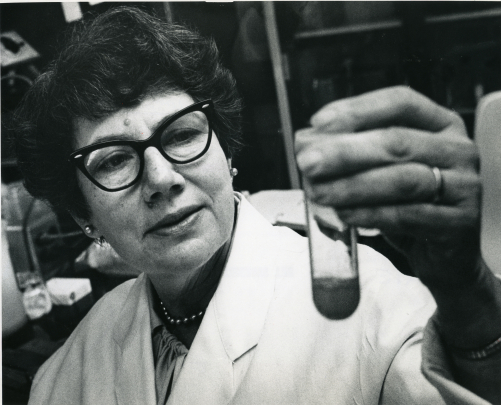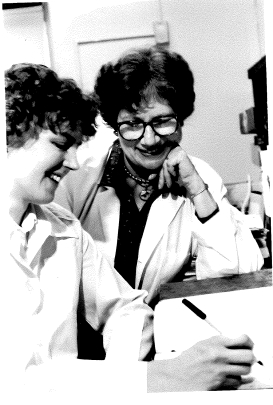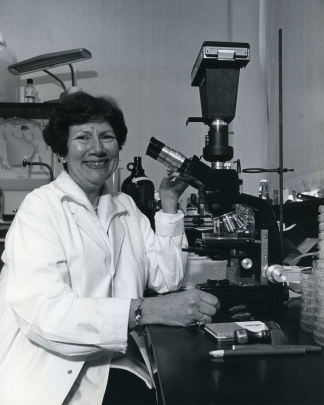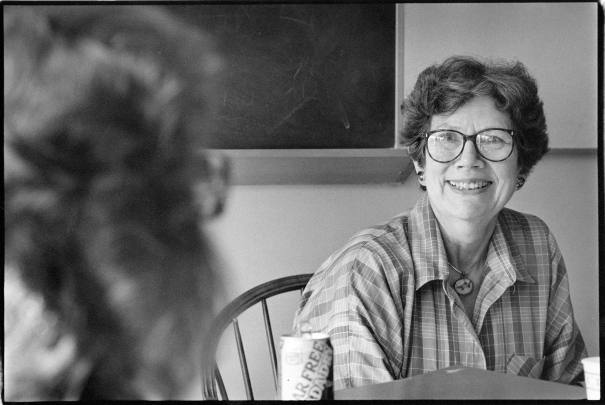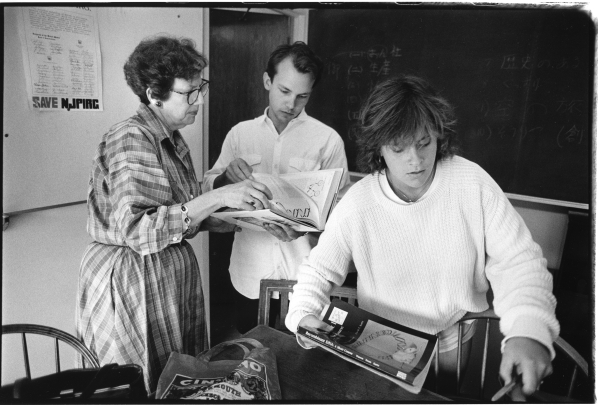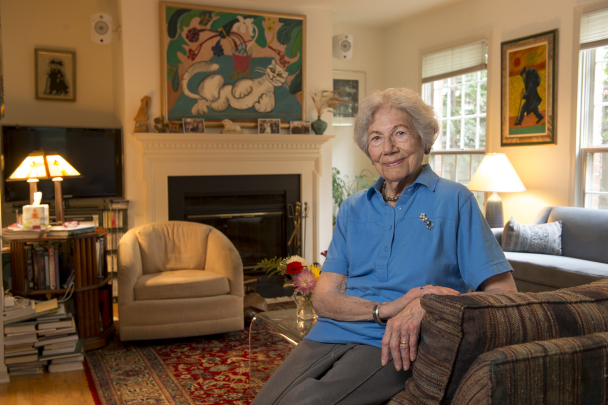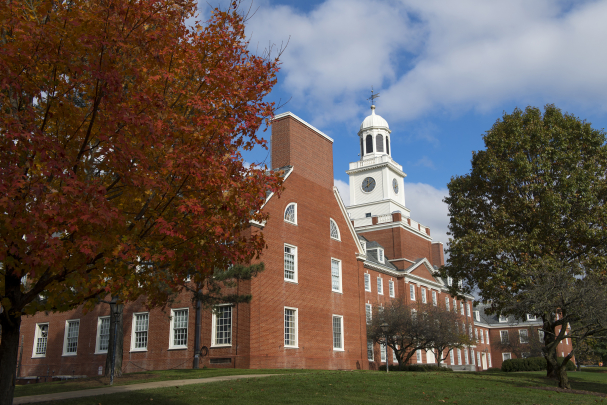Rutgers Celebrates World-Renowned Geneticist Evelyn Witkin as She Turns 100
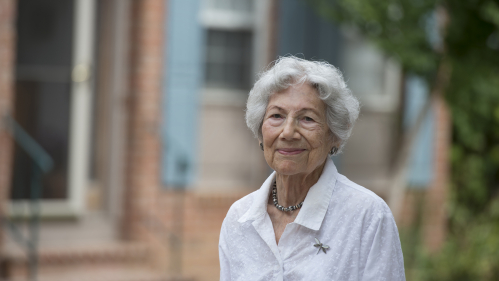
Waksman Institute names research lab to honor Witkin, a pioneer who opened pathways for women in the biological sciences
More than three decades ago, Evelyn M. Witkin, a world-renowned geneticist who unlocked secrets to how cells respond to DNA damage, was inspiring students like Joann Sweasy as a professor in the classroom at Rutgers.
Sweasy said Witkin, considered one of the most accomplished scientists ever at Rutgers, gave her the confidence she needed to believe in herself and become the respected scientist she is today, even when her scientific experiments failed.
“She always supported me,” said Sweasy, director of the University of Arizona NCI-Designated Comprehensive Cancer Center and professor in cellular and molecular medicine, chemistry and biochemistry, and genetics at the University of Arizona, who remembers the passion Witkin brought to the classroom and the knowledge she shared in the laboratory. "That is what made the difference.”
On April 13, Sweasy and more than 300 scientists and others from around the world will come together at a daylong virtual symposium to honor Witkin, a pioneer for women in the field of Science, Technology, Engineering and Math (STEM) and the recipient of numerous awards including the National Medal of Science. Witkin will become only the second person to have a laboratory at the Waksman Institute for Microbiology named in their honor and the first woman.
“The laboratory is being named after Dr. Witkin because she was an outstanding scientist," said Kenneth Irvine, interim director of the Waksman Institute, named after Selman Waksman, a student and later a professor who won the Nobel Prize for Medicine in 1952 for research that led to the discovery of streptomycin. “But certainly it’s important to note that she was a pioneering woman scientist, working at a time when science was dominated by men.”
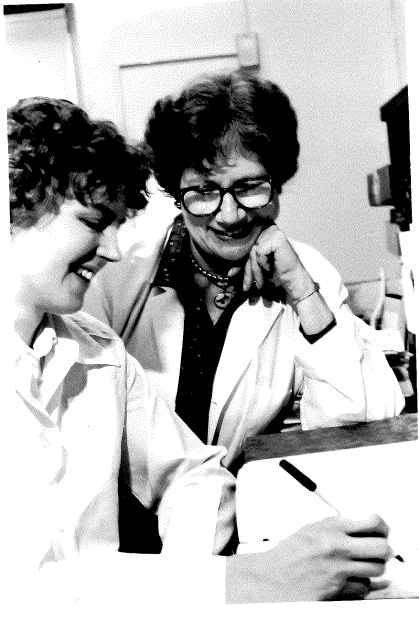
The Rutgers professor emerita, who turned 100 this month and whose career as a teacher and researcher at the university spanned two decades before she retired in 1991, is among a group of scientists, clinicians and public servants credited for making major advances in the understanding, diagnosis, treatment, cure or prevention of human disease. Witkin is expected to give closing remarks during the symposium.
“Her work underpins our understanding of DNA damage and DNA repair in all living organisms, from bacteria to humans, and for understanding how DNA damage and DNA repair affect cancer and aging,” said Richard Ebright, a Board of Governors Professor of Chemistry and Chemical Biology and laboratory director at the Waksman Institute. “This recognition has been long overdue. We are thrilled to be able, at last, to make it happen.”
Witkin, whose scientific accomplishments have played an important role in the biomedical sciences and in clinical radiation therapy for cancer, has been recognized for her research – most recently in 2015 with the Lasker Basic Medical Research Award, which she shared with Stephen Elledge from Brigham and Women’s Hospital in Boston. She is the only Rutgers researcher besides Waksman to receive the Lasker Award, an award considered second only to the Nobel Prize.
Witkin, who started at Rutgers’ then Douglass College in 1971 as a professor of biological sciences, is a member of the National Academy of Sciences, a fellow of the American Association for the Advancement of Science and the American Academy of Arts and Sciences. She also received the Wiley Prize in Biomedical Sciences and the Thomas Hunt Morgan Medal of the Genetics Society of America.
Considered to be an inspiration to her colleagues and students, Witkin has been passionate about both her research and social justice issues throughout her life.
As an undergraduate student at New York University in 1940, Witkin was one of the “Bates Seven” who led a campuswide protest over what they thought was blatant racism. At the time, some northern universities had made “Gentleman Agreements” with southern universities to keep Black football players from playing on segregated universities’ home fields. Leonard Bates, the star fullback and the only Black player at NYU, was prevented from traveling to the University of Missouri with the team to play.
The “Bates Seven” were suspended for three months after 2,000 students picketed the administration building and more than 4,000 signed a petition. Her role in the protests prevented Witkin from graduating in May 1941 and changed the course of her studies.
“I had planned to stay at NYU for graduate work in genetics, but I decided to go to Columbia,” she wrote in a story published in the National Science and Technology Medals Foundation publication in 2016. “My having gone to Columbia was the greatest blessing that ever happened to me professionally. I’m not sure I would be a National Medal of Science Laureate if New York University hadn’t decided that I was a bad girl in 1941.”
Witkin’s legacy might not be known by the at-large Rutgers community, but for Juan Dong, associate professor in the Department of Plant Biology and Pathology, whose lab will occupy the new Evelyn M. Witkin Laboratory, Witkin’s long list of achievements is inspirational to her and other women scientists.
“Dr. Witkin showed us that women can be leaders of scientific research back in 1940s,” said Dong, who studies molecular mechanisms for cell division and differentiation in plants and uses genetic strategies to study plant developmental processes and their responses to environmental changes.
“However, women have been consistently represented at roughly 25 percent of the STEM workforce over the past 30 years in the United States,’’ Dong said. “The remarkable achievements that Dr. Witkin made will be highly inspirational for young students, particular young women, to pursue careers in the STEM field.”
